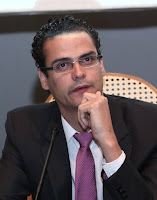Eduardo Gonzalez, director of ICTJ’s Truth and Memory Program, closed today’s discussions, thanking panelists, organizers, donors and partners, and all who came to participate in the conference. He opened by acknowledging that every state’s experience with transitional justice is unique; there is no one method that can be universally applied. It is nevertheless crucial to engage in a comparative analysis of the lessons learned and experiences of other countries in transition.
While this conference has focused on sharing the comparative experiences throughout Latin America, this has not been an academic exercise but a call to action, Gonzalez said. The experts who spoke in the past two days are activists who have lived through and experienced the fight against dictatorship, abuses and impunity. He urged Brazilian authorities to learn from the experiences of other countries and called on Brazilian activists to continue the fight for truth, accountability, reparations, and justice.
He concluded by summarizing the discussions of the conference.
The first session was on reparations and the importance of consistency, completeness and sustainability of reparations policies. Panelists shared lessons learned in reparations programs in Peru and Chile. In the keynote speech Cristian Correa, ICTJ senior associate, highlighted the importance of holistic reparations measures and listening to the experiences and needs of the victims when implementing reparations.
The second session was on institutional reform: transforming the security forces in times of transition, with experiences of Argentina and El Salvador discussed. Speaker Juan Faroppa, consultant of the Inter-American Court of Human Rights, spoke about the role of security forces in guaranteeing the rights of the population and suggested measures to ensure this is achieved.
The final session of the first day focused on truth-seeking: the right to truth and the role of truth commissions in achieving it. Priscilla Hayner, senior advisor to the Centre for Humanitarian Dialogue, reflected on the power gained from investigating and establishing the truth and the role Latin America has played in setting the standards we now come to expect from truth commissions.
The second day began with a session on criminal justice, focusing on amnesty laws, the Inter-American Court of Human Rights, and the impact of international jurisprudence in the domestic prosecution of human rights violations. The central presentation was given by Victor Prado Saldarriaga, judge of the Supreme Court of Peru, who discussed different types of amnesty laws that have been used in Latin America and what these laws meant for perpetuating impunity.
Session five focused on safeguarding archives and access to information. Panelists debated states’ obligation to preserve archives of human rights violations and make information available to the public. Catalina Botero, Special Rapporteur for Freedom of Expression, Inter-American Commission on Human Rights led the panel with an analysis of access to information as a right, and the limitations and obligations to this right.
The final session of the conference focused on the role of civil society in transitional justice. Javier Ciurlizza, director of the Latin American and Caribbean Program at the International Crisis Group argued that civil society must carry the fight for the principles behind transitional justice, using examples from Chile, Spain, Colombia, Argentina and Guatemala to illustrate the relationship between social movements and human rights in the success of political transitions.





















